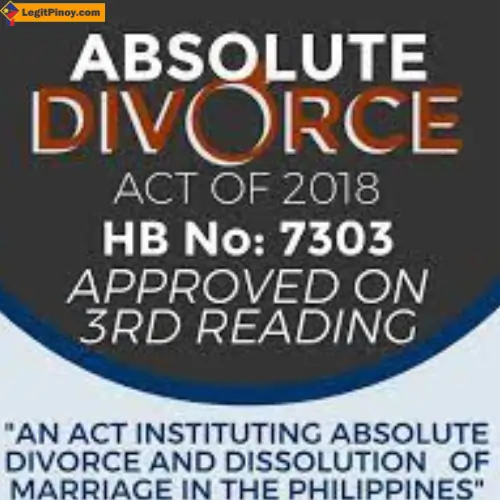Divorce Bill Philippines:
The Philippines Considers Divorce

Advertisement
How to play Tala888 Scratch? Click me 👇👇Claim free PHP888 Welcome Bonus! Play Now!

Historical Background: Divorce Bill Philippines
Because of its strong Catholic heritage, the Philippines upholds strict marriage laws that are in line with traditional beliefs that place a high priority on the sanctity and stability of marital unions. Unlike other countries where marital dissolution rules are becoming more liberal, the Philippines has opted to keep marriage as a lifelong commitment by not having divorce laws.
Current Legal Framework
Couples can seek a legal separation or marriage annulment under existing Philippine legislation, but they cannot get a divorce. Unless they remarry, legal separation allows partners to live apart without terminating their marriage, but annulment declares a marriage null and void from the beginning and often necessitates substantial proof and financial outlays.
Previous Legislative Attempts
Despite several attempts to introduce divorce legislation, strong opposition, primarily from religious institutions, has hindered progress. Bills proposed in the past two decades have consistently faced resistance, failing to gain legislative support to become law.
Grounds for Divorce
What are grounds in the proposed Divorce Bill?
The proposed divorce bill outlines specific grounds under which divorce would be granted, including marital infidelity, abuse, abandonment, and irreparable breakdown of the marriage. These provisions aim to address situations where the marriage is no longer tenable, protecting the parties’ well-being.
Procedures and Requirements
The bill proposes a streamlined legal process for filing and obtaining a divorce, reducing the procedural complexities and financial burdens currently associated with annulment. This includes provisions for mandatory counseling and a cooling-off period to ensure that couples fully consider their decision.

Advertisement
How to play Tala888 Scratch? Click below👇👇Claim free PHP888 Welcome Bonus! Play Now!

Protection for Women and Children
The bill includes provisions to protect women’s and children’s rights and welfare because it acknowledges their vulnerability in marital conflicts. These provisions ensure that custody, support, and property division are handled equitably, prioritizing the children’s best interests.
Pro-Divorce Arguments
Human Rights and Personal Freedom: Advocates argue that the right to divorce is a fundamental human right, allowing individuals to escape unhappy or abusive marriages and rebuild their lives.
Addressing Marital Abuse and Irreparable Breakdowns: Proponents highlight that divorce provides a necessary escape for those suffering from domestic violence or irreparable marital breakdowns, offering legal recognition and protection.
Alignment with International Practices: Supporters emphasize the need for the Philippines to align with international norms, noting that it is one of the few countries worldwide without a divorce law.
Key Supporters
The movement for divorce legislation is backed by a diverse coalition of lawmakers, advocacy groups, women’s rights organizations, and notable public figures. These supporters emphasize the urgent need for legal reform to protect individuals trapped in untenable marriages.

Anti-Divorce Arguments
Protection of Family Unity and Moral Values: Opponents argue that divorce undermines family unity and moral values, advocating for preserving marriage as a lifelong commitment.
Religious and Cultural Objections: Strong religious and cultural objections form the core of the opposition, with institutions like the Catholic Church vehemently opposing divorce.
Potential Social and Economic Impacts: Critics warn of the potential social and economic impacts, including the destabilization of family structures and increased financial burdens on the state.
Key Opponents
Key opponents include religious institutions, conservative lawmakers, and family-oriented organizations. These groups argue that the introduction of divorce would erode the moral fabric of society and undermine the sanctity of marriage.
International Perspective
Globally, many predominantly Catholic countries have enacted divorce laws, balancing religious doctrines with modern legal frameworks. Countries like Italy and Spain, once staunchly opposed to divorce, have embraced legal reforms, reflecting changing societal values.
Case Studies
Examining recent changes in divorce laws in countries like Ireland provides valuable insights. Despite initial resistance, Ireland’s transition to allowing divorce demonstrates the possibility of balancing religious values with the need for legal protections.
Effects on Families
The potential impacts on families are multifaceted. While divorce can lead to emotional and financial challenges, it can also provide relief and protection for individuals in abusive or unhappy marriages, allowing for healthier family dynamics.
Economic Considerations
The introduction of divorce could have significant economic implications, including increased demand on the legal system and potential financial benefits from reduced costs associated with annulment and separation proceedings.
Surveys and Polls
Recent surveys indicate a growing public support for divorce legislation, reflecting changing societal attitudes towards marriage and individual rights. This shift suggests increasing acceptance of divorce as a necessary legal option.
Media Coverage
Media portrayal of the divorce debate highlights the deep divisions within Philippine society. Coverage often juxtaposes the personal stories of those advocating for divorce with the staunch opposition of religious and conservative groups.
Bill’s Journey
The divorce bill’s legislative journey has been marked by significant debate and scrutiny. Despite passing initial readings in the House of Representatives, the bill faces a challenging path in the Senate.
Current Status
As of the latest updates, the divorce bill remains under deliberation in Congress. Ongoing discussions and amendments aim to address concerns and build broader support for the legislation.
Future Prospects
While the future of the divorce bill remains uncertain, increasing public support and advocacy efforts suggest a potential shift toward eventual legislative approval. Continued dialogue and compromise will be crucial in shaping the bill’s final form.
Complementary Reforms
The introduction of divorce legislation is part of broader efforts to modernize Philippine family law. Complementary reforms, such as updates to child custody laws and enhanced protections against domestic violence, are essential to ensure comprehensive legal support.
Broader Social Change
The divorce bill reflects broader social changes in the Philippines, signaling a shift toward greater recognition of individual rights and protections. This legal evolution is part of the country’s ongoing journey towards aligning with international human rights standards.
Summary of Key Points
The debate over the divorce bill in the Philippines encapsulates a complex interplay of legal, social, and cultural factors. Proponents argue for personal freedom and protection against abuse, while opponents emphasize the preservation of traditional values and family unity.
Implications for the Future
The potential introduction of divorce legislation marks a significant turning point in Philippine society. If enacted, the bill could profoundly impact the legal system, family dynamics, and societal values, reflecting the country’s adaptation to contemporary global norms.
We may also recommend:
You may also read the following:
- Wow888
- betso88
- bk8
- Majesty33
- Okebet168
- lodi291
- Phl63
- JiliCC
- jlbet
- phjoy
- phwin
- slotvip
- panalobet
- mnl63
- 10jili
- ok777 win
- jili22
- Lucky777 Casino
- lodigame
- Peso888
- intgames
- 22win
- milyon88
- ME777
- luckyjackpot888
- MNL777
- YY777
- SuperPH
- FC777
- JILIHOT
- Big Baller Club
- JILIPLAY
- MWPLAY888
- Playzone
- S5 Casino
You may also like:

Jillian Cruz is a versatile blogger and content writer known for her curiosity and passion for writing about various topics. Her engaging writing style attracts readers from all backgrounds. She also collaborates with brands and publications, bringing her unique perspective to marketing campaigns and articles. With her creativity and dedication, Jillian continues to make an impact in the world of blogging and content creation.
